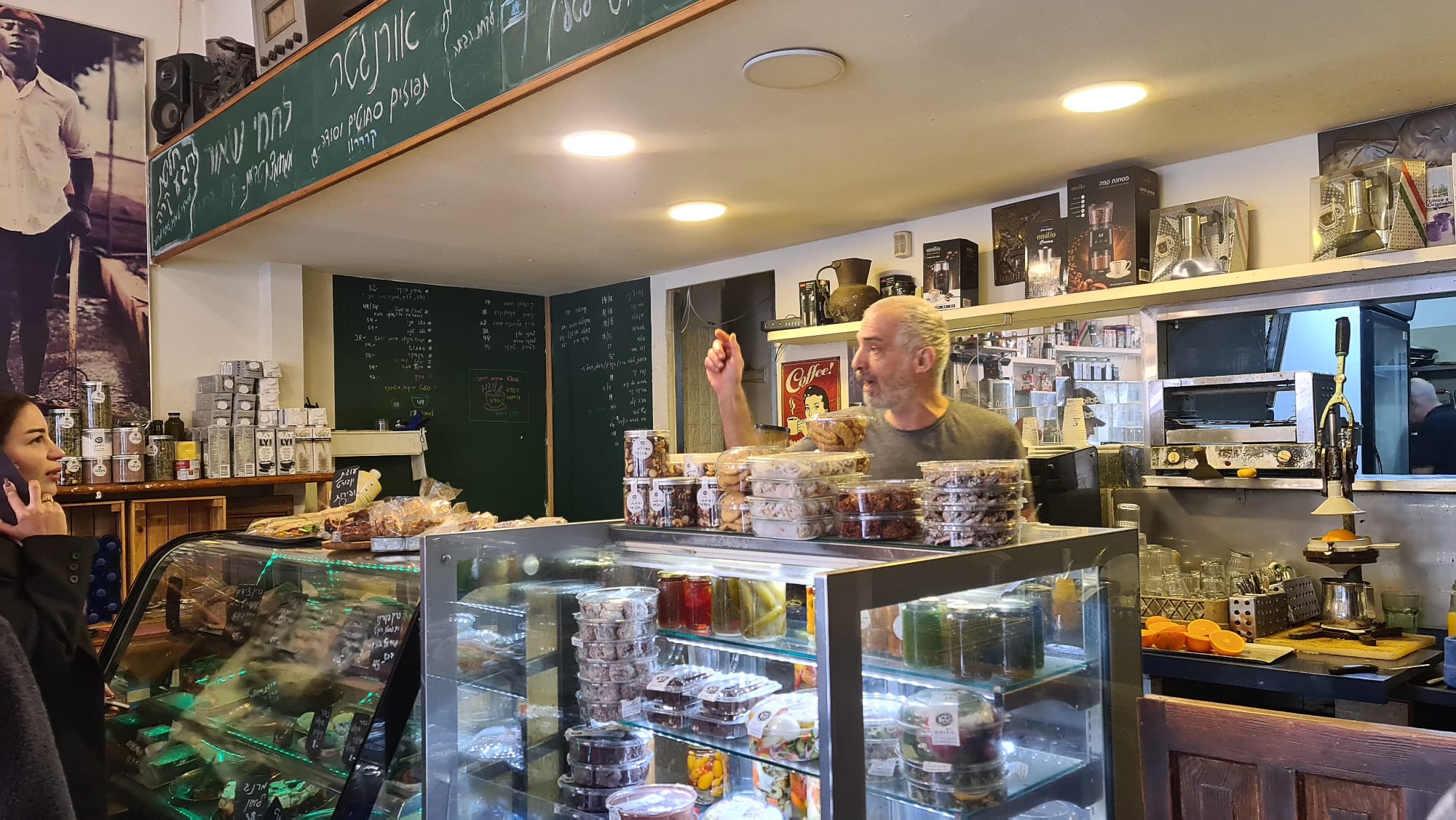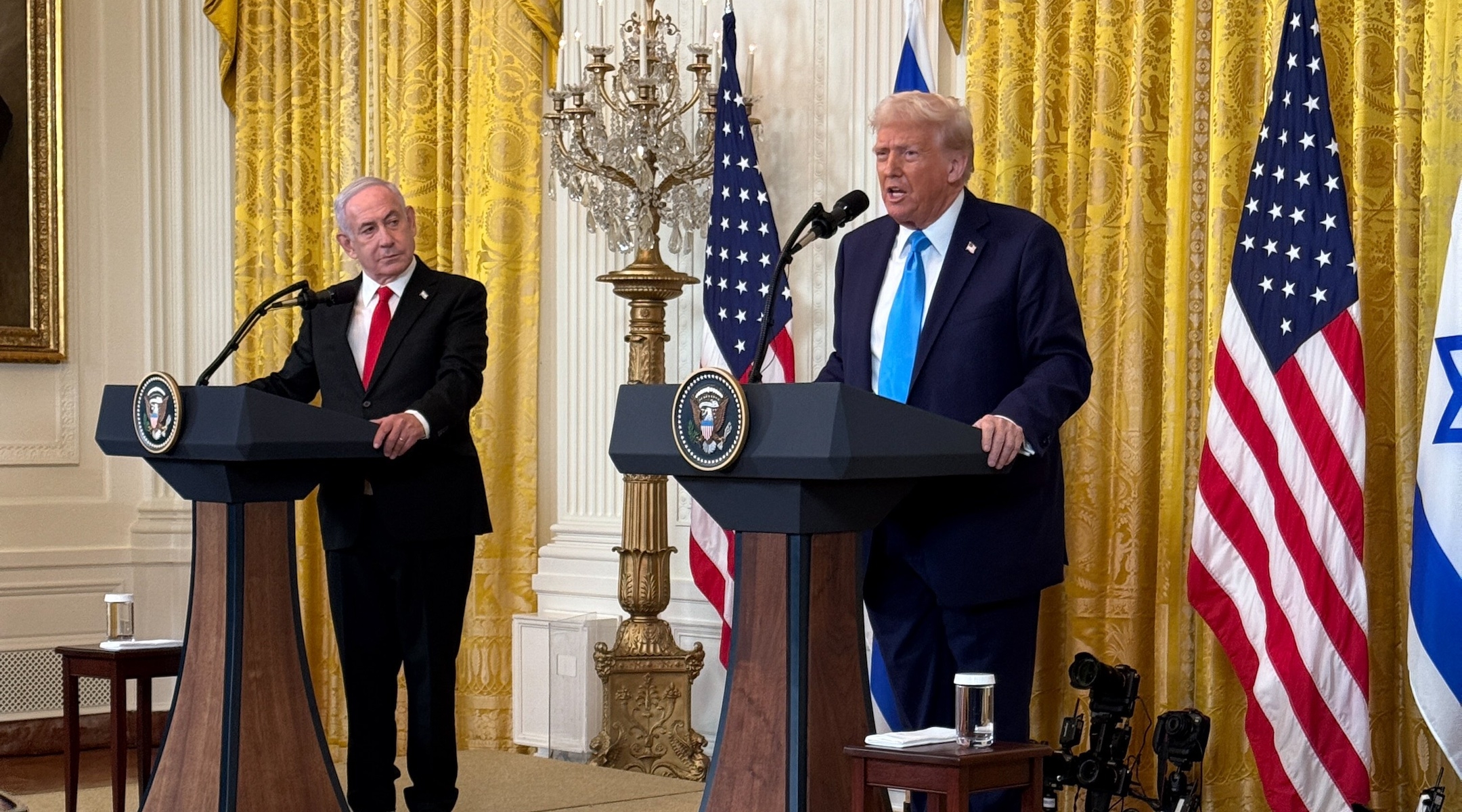TEL AVIV — On Wednesday morning, cars driving down Tel Aviv’s main freeway were greeted with a new set of giant billboards bearing American flags, a photo of Donald Trump and a message, in English: “Thank you, Mr. President.”
The billboards, erected by Republicans Overseas Israel, did not say why they were thanking the president. But by the time Israelis embarked on their morning commutes, many of them could guess: Just hours earlier, in Washington, D.C., the president had declared that “all” Palestinians would leave Gaza — and that the United States would “take over.”
It was a shocking promise — one that would fulfill the wildest dreams of the Israeli far right and offer an unexpected answer to who would govern Gaza after the war. But notwithstanding the billboards, Israelis reacted with a range of emotions. Some were elated. But others were skeptical, confounded — or horrified.
“I woke up in total shock. I always think, that’s it, we’ve reached the bottom of the bottom, but then I’m shocked anew,” said Orian Canetti, sitting in a Jaffa coffee shop across the street from the bilingual Hebrew-Arabic school her children attend. “I want to imagine that he has a plan but I just don’t have the tools to even begin to understand him. What he said just doesn’t compute.”

Avner Goren, a cafe employee in Yafo, said he did not immediately form an opinion on Donald Trump’s proposal to “take over” Gaza, Feb. 5, 2025. (Deborah Danan)
Barak Moore, who hails from the West Bank settlement bloc of Gush Etzion, also had reservations about the plan — but only because the Bible says the land of Israel belongs to the Jews, not the United States.
“This is terrific news other than the part about America taking ownership of the land that God gave to the Jewish people,” he said. “Having said that, if President Trump is able to dismantle the Hamas death cult and set free the many Gazans who are desperate to flee from it, it would be among the greatest political achievements ever.”
Ever since the Oct. 7, 2023, Hamas attack that launched the war, Israelis have wrangled with each other, and with international interlocutors, over what will happen next with Gaza. The government hasn’t released a “day-after” plan, and surveys show that Israelis remain split on the question. But nearly all of them agree on one thing — Hamas cannot be allowed to retake power in Gaza — and for some, Trump’s bombshell proposal guaranteed that would never come to pass.
“We woke up in Israel to wonderful news!” said Adalia Citron, from the central Israeli city of Beit Shemesh. “Obviously Trump will not have to ‘own Gaza’ but he means business and is sending out a clear and strong message that we will no longer allow history to repeat itself. Gazans have proven decade after decade that the billions of dollars received in aid was used for weapons and terror tunnels, jihadist training and terrorism. This will no longer be an option for them.”
The news dominated Israeli social media as well, where one meme showed a map of Gaza renamed the “Magaza Strip,” a mashup featuring Trump’s trademark MAGA slogan. Another superimposed the Trump International Hotel in Las Vegas onto a scene of northern Gazans returning to their homes amid a landscape of rubble — a visual that evokes a Wall Street Journal report that said Trump had urged Netanyahu last summer to “think about what kinds of hotels could be built there.”
One Israeli-American quipped on Facebook, “Ooh, can we bring Target? And Starbucks and Sephora?” to which another replied, “Let’s dream big: Nordstrom.”
By late Wednesday, the White House was backtracking on Trump’s comments, saying that Trump does not intend to supply U.S. money or troops to aid in rebuilding and that any resettlement would be temporary, not permanent. But Trump was also drawing kudos for injecting a radical new idea into a dynamic that has long been stuck.
Yovav Kalifon, from Tel Aviv, said the radical plan clashed with the reputation Netanyahu has gained in Israel for being risk-averse. Still, he said, using the prime minister’s nickname, “Bibi’s pledge to topple Hamas and restart Gaza is aligned with Trump’s declaration. Israel’s military liberates Gaza from Hamas, then we look for entities to manage that territory. The USA is one such entity.”
But others said the plan displayed ignorance about Palestinians’ ironclad connections to their land. Huda, an Arab mother who was sitting alongside Canetti in the Jaffa cafe and did not disclose her last name, said that Trump had no understanding of the Palestinian people and their “unmovable faith in God to continue to fight for their basic rights and their ties to the land.”
She added, “They would rather live in a hut in Gaza than any luxury place Trump could offer them.”
Not far from Huda, Avner Goren, an employee at the cafe, was unsure what to think.
“Trump is so unpredictable but still, I was so shocked to hear it,” he said. “And because of that, I haven’t yet formed an opinion. That’s probably the most important thing I’ll say. People are always so quick to form opinions.”
He continued, using the Arabic term that describes the mass displacement of Palestinians during Israel’s founding, “But I’ll tell you one thing. The Nakba is the biggest founding stories of the Palestinians. I don’t know how that can be overcome.”
Others said they didn’t trust the United States to manage the massive undertaking of moving Gaza’s entire population, clearing out its many tons of rubble and building it anew.

A man sells goods in front of the rubble of destroyed buildings in the northern Gaza Strip, Feb. 5, 2025. (Photo by Omar al-Qatta/AFP via Getty Images)
“I’m nervous that it will create much more mess,” said Shlomi Ben Shimol, who was evacuated from his home near Israel’s northern border because of Israel’s war with Hezbollah. “Every place we’ve seen the Americans try and control ends up worse.”
Daniel Ohana, a fellow evacuee from the north, said, “If Trump would manage to get 20% of the population of Gaza out, I’d consider that a success.”
Matthew Kalman, a Jerusalem-based journalist, described the idea as delusional.
“Yes, Hamas is evil and has no right to govern anything,” he said. “Yes, Oct. 7 was a horrific, murderous turning point whose brutal lessons cannot be ignored. But real problems cannot be solved through magical thinking. Trump and Psycho-Bibi have stepped through the looking glass and are lost in space.”
Some were more confident. Michael Bassin, an American-Israeli, echoed Trump’s own reasoning — that decades of violence demanded out-of-the-box solutions.
“Resettling Gazans in surrounding countries will be good for Gazans and good for us,” he said. “Refugee resettlement is nothing new and happens all the time. Rebuilding Gaza into something positive is a great idea. I don’t know if it’s realistic or not, but it’s new thinking and that’s just what we need. We need to do away with what has not worked in the past and move forward towards something new.”
In the Jaffa coffeehouse, Canetti was resigned — and invoked another territory Trump has vowed to conquer.
“What does it matter anyway?” she said. “I’m moving to Greenland.”
Keep Jewish Stories in Focus.
JTA has documented Jewish history in real-time for over a century. Keep our journalism strong by joining us in supporting independent, award-winning reporting.









 English (US) ·
English (US) ·